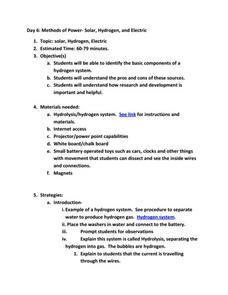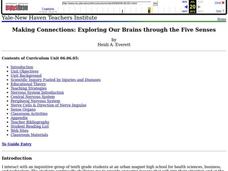Curated OER
Rocks and Soils
Students compare the properties of rocks and relate these properties to their use. They perform a virtual experiment to describe and group rocks on the basis of their characteristics.
Curated OER
Ourselves
Students identify the main parts of the human body. They point to various parts of their own body, cut out pictures of humans and animals and sort them into the two categories, discuss the differences between animals and humans, and...
Curated OER
Human VS Animal Skeletons
Students research and compare human and animal skeletons. They identify human skeletons basic functions and parts.
Curated OER
Spinners of Color
Students review primary, secondary, and intermediate colors. They use a worksheet to select the combination of colors they want to try on the spinners. They predict the outcome of the spinning colors.
Curated OER
Making Connections: Exploring Our Brains through the Five Senses
Students record observations and create drawings and models of anatomy using their five senses. They describe the structures of a neuron and analyze each of their functions. They compare and contrast the typical structural features of a...
Curated OER
Water, Water Everywhere and Not a Drop to Drink
Students discuss the importance of taking care of their water supply so not only they can use it but generations in the future. In groups, they examine a real pollution scenario in which a sewer overflowed into the ground water. They use...
Curated OER
The Sun
Students draw diagram of sun and its layers, including photosphere, chromosphere, corona, convection and radiative zones, and core. Students then describe each layer in their own words, define sun spot cycle, and describe solar flares.
Curated OER
Habitats
Young scholars complete food chains for organisms in three environments. They use copies of the Habitat worksheet. Students review the food chain terms with the teacher. They research related food chains, and interlink these to form a...
Curated OER
Learning the Parts of a Plant
First graders discover the anatomy of a plant by labeling a picture. In this botany lesson, 1st graders examine and dissect several real plants in class and define their different parts. Students utilize the Internet to view...
Curated OER
Micro-Organisms
Students investigate micro-organisms with an on line activity. In this micro-organism on line lesson plan, students identify bacteria, viruses and fungi projected onto a white board. Students work in groups and use a computer and an on...
Curated OER
Interdependence and Adaptation
Fifth graders construct a food web to illustrate how animals and plants are interdependent. For this interdependence lesson, 5th graders identify how consumers, producers, herbivores, carnivores and predators are related in a habitat....
Curated OER
Reversible and irreversible changes
Students experiment with solids and liquids to find which solids will dissolve in water. This dissolution and mixtures lesson can be completed online or in class as all materials are connected to the lesson plan for both settings.
Curated OER
Using Electricity
Students read The Lighthouse Keeper's Lunch to become familiar with the way a lighthouse works.In this using electricity lesson, student create lighthouses with plasticine clay and a working circuit. Students complete a worksheet on...
Curated OER
Sorting and Using Materials
Young scholars explore materials and their properties. In this matter lesson, students identify objects and describe their properties. Young scholars test and sort materials using an interactive whiteboard, followed by a group discussion...
Curated OER
Friction
Students compare and contrast the movement of objects on different surfaces, experimenting with friction and forces of motion. This friction lesson has numerous online tools including worksheets and virtual activities; the option is also...
Curated OER
How We See Things
Students investigate how mirrors reflect light. In this reflection lesson, students draw the path of the light reflected from a mirror. Students construct a list of objects that are light sources.
Curated OER
Wreck Detectives
Students investigate shipwrecks. In this marine archaeology lesson ,students collect data and make inferences about the causes of shipwrecks. Students work in groups to create their own model of a shipwreck using clay. Students then...
Curated OER
Death On Board La Belle: Finding Clues from Old Bones
Students practice analyzing skeletal remains for clues by using the Internet. In this scientific investigation lesson, students research the La Belle shipwreck using the Internet and written materials, later completing a Skeletal...
Curated OER
Methods of Power- Solar, Hydrogen, and Electric
Young scholars examine solar, hydrogen, electric power. In this research based lesson, students will do simple investigations, view videos, discuss, and research how these three types of energy are used for power. They illustrate a...
Curated OER
Exploring Meteorite Mysteries: Building Blocks of Planets
Students simulate the formation of chondrites and asteroids. In this astronomy lesson plan, students demonstrate accretion using balloons and static electricity. They compare and contrast their models to the actual process of chondrites...
Curated OER
Making Connections: Exploring Our Brains through the Five Senses
Students identify structures of the brain, and neurons and analyze their functions. In this nervous system instructional activity students create drawings and models of anatomy.
Curated OER
Jane Goodall, Renowned Naturalist and Champion of Chimpanzees
Students study the life of Jane Goodall and how she made an impact studying chimpanzees. In this endangered species lesson students write in their journals.
Curated OER
WAVES AND PHOTONS
Students examine the many types of electromagnetic waves, the concept of an EM wave, how James Clerk Maxwell proposed a slight modification of the equations of electricity, Heinrich Hertz and his radio-frequency, wavelengths, and light...
Curated OER
CONVECTION
Students experiment to produce a visual convection current in the classroom and compare it to the images taken of convection cells in the Sun. They analyze the source of the Sun's energy and this type of energy transport.

























